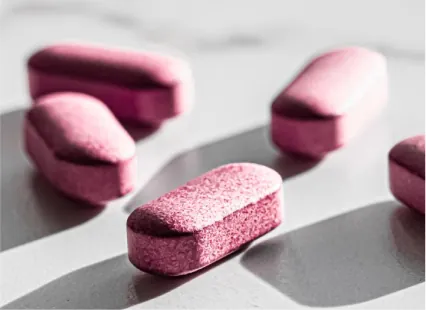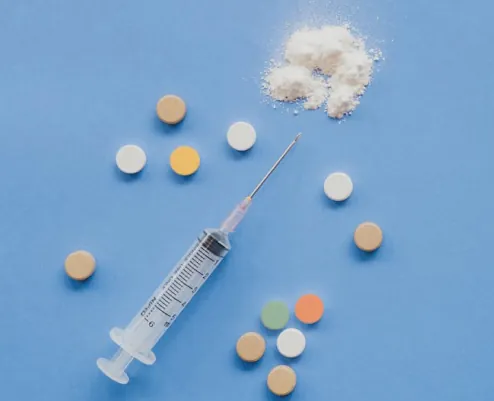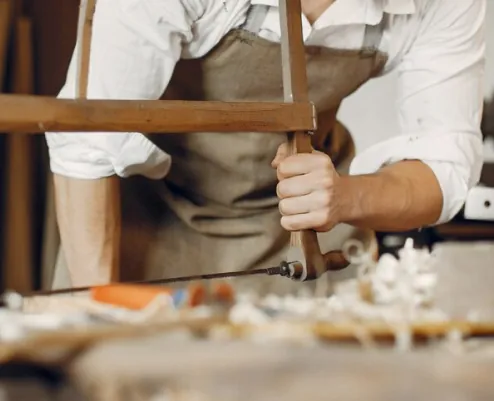Overcoming addiction doesn’t end with stopping the substance abuse. It also includes addressing the issues that came with it. One of these issues is harmed relationships with your family, friends, and significant others. Trust can be broken, and feelings can be hurt on both sides. Fixing these damaged bonds is hard. A simple “I am sorry” won’t do it. It involves honesty and time. As long as you stay committed, put in the effort, and rely on our support during and after your rehab in Lake Worth FL, repairing relationships after addiction is possible. We are here to help you break free from your cravings, rebuild trust, and make the connections with loved ones even stronger.
Addiction Problem in Lake Worth, Florida
In 2021, Florida reported 8,093 deaths due to overdoses. This enormous number clearly indicates that Florida is dealing with a major addiction crisis. Especially since it is clearly noted that the number of drug overdose deaths has been on the rise in the last few years.
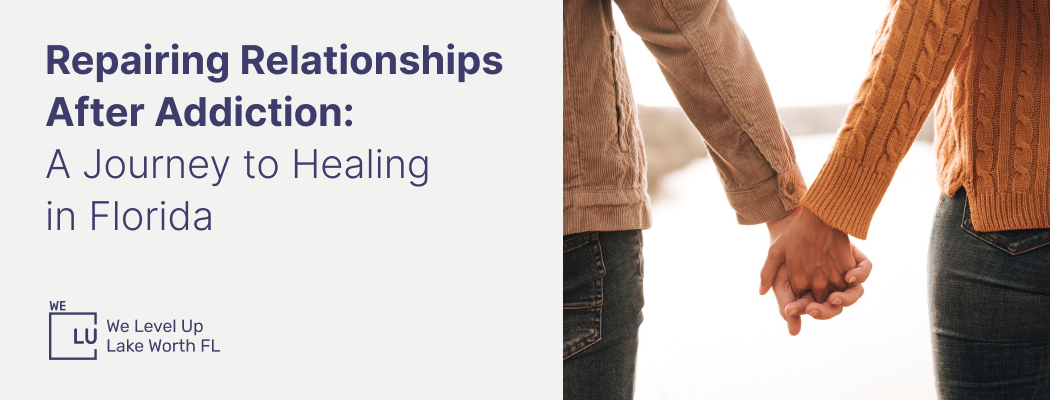
Besides the immediate threat of a fatal overdose, survivors and their families face numerous challenges. Among the most significant is repairing relationships after rehabilitation, as they were harmed by the cycle of substance abuse. This process is important for a holistic approach to recovery. Strengthening the bonds with those who care about you and support you while you get well is crucial.
The Impact of Addiction on Relationships
Addiction puts a heavy strain on all types of relationships. Let’s explore how it affects:
- Marriages and partnerships,
- Families,
- Friendships.
How Substance Abuse Affects Marriages and Partnerships
When the addiction becomes a problem in your relationship, it creates a gap between you and your partner. This gap doesn’t just show up all of a sudden. It builds up over time and shows up in many ways. You might start arguing a lot, often about money, irresponsible behavior in general, or how you act irrationally. These fights often get bigger and more serious. They can turn to conflicts about how the relationship is headed or how committed you are to getting better.
Money problems often come hand-in-hand with addiction. You might end up spending on your addiction instead of on things you and your partner need or want to save for. This can make your partner feel stressed about money and upset with you for putting this burden on them.
As addiction takes over, you might also start pulling away emotionally from your partner. It’s like the addiction becomes the most important thing, and there’s less room for the kind of close connection you used to have. Your partner might feel lonely and ignored, as if they don’t matter as much to you anymore.
Trust issues usually make everything worse. If you lie about your substance use, break promises about getting help, or disappear without explanation, your partner might start to doubt if they can believe anything you say, which will make repairing marriage after addiction even more difficult. Breaking the circle of trust leads to a point where your partner can’t rely on you for anything, which inevitably causes much bigger problems.

The Effects of Addiction on Families
Addiction can shake up how a family works. All members end up feeling the consequences, and that can change domestic dynamics. For instance, when one parent is battling addiction, it’s not uncommon for children to have to take care of their younger siblings. Or for the other parent to take up the finances and household maintenance on their own. Feeling trapped in occupations they didn’t ask for can add stress and anger to everyone’s life.
Then there’s the sense of nervousness, which is quite high. Your well-being, current situation, and future prospects are everyone’s worries. Feelings of anxiety, depression, or even physical illness can set in after a while of this persistent concern. Children’s development and academic performance can be negatively impacted if they experience excessive confusion and stress levels.
Your loved ones may be walking on eggshells around you, afraid to say anything that could trigger your addiction. The already high level of tension at home becomes even more apparent when no one feels comfortable expressing their emotions openly.
Resentment can start to build up, too. You may feel alone in your struggles, and your loved ones can get frustrated by the constant instability in your life. Because of this, people often begin to feel even more isolated.
Ultimately, it can be difficult to maintain the unity and team spirit your family once enjoyed. Things you used to do together, or traditions you had might not happen anymore, making it feel like that sense of togetherness is slipping away.
Sometimes, in trying to keep the peace or help out, your family might accidentally make things easier for your addiction to stick around. This could be by covering for you or providing financial assistance, even if you are an adult. While it’s meant to help, it can make things tougher in the long run. So, no matter if a child is all grown up, in case they are battling addiction, there are some tips for parents of addicted adults that can help them not make things worse than they already are.
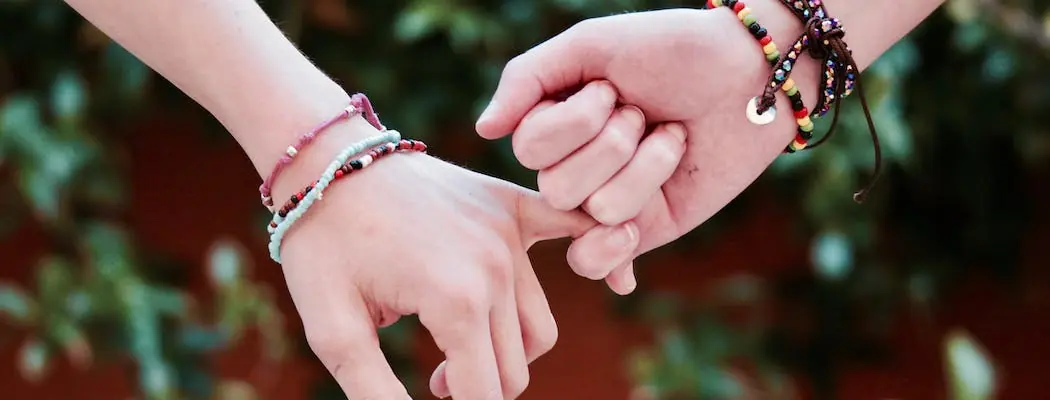
Friendships Affected by Addiction
You might start pulling away from your friends. Maybe you feel ashamed, or you just want to keep your addiction secret. This can make you want to hang out alone or just with people who are in the same habits. Because of this, your old friends may start to feel distant from you and cut all ties.
Then, there’s the crowd you end up with. When you’re battling addiction, you may connect with people who normalize your habits. They may not encourage you to stop using because they aren’t concerned about you or are in a similar situation. Friends who genuinely care about you and wish the best for you may become estranged as a result of this.
Your friends might also feel like they’re not that important to you anymore. They miss the fun times and deep talks you used to have. It’s hard for them because they don’t get why they’re suddenly out of the picture.
They also might not know how to help you. Their fear of making things worse prevents them from being there for you, even when they want to. Not because they are insensitive but rather because they’re afraid, and this can force them to keep their distance.
Sometimes, repairing relationships after addiction is not possible. There comes the point where your friends might decide they need to take a step back for their own good. It’s not that they don’t love you or want the best for you. It’s just really hard for them to watch you struggle and not see any change or be able to help you. This decision hurts, but occasionally, they feel it’s necessary.
Steps to Repairing Relationships After Addiction
Restoring connections after dealing with substance abuse is a very important part of recovery. Here is how to fix a relationship after drug addiction:
- Acknowledge and apologize.
- Communicate openly.
- Rebuild trust.
- Seek professional help.

Acknowledge and Apologize
First, it’s important to acknowledge the harm caused by your addiction. This means facing the effects your actions have had on loved ones. You need to give a sincere, heartfelt, and specific apology. It should show that you understand the pain and problems your addiction has caused. This isn’t about making excuses. It is about taking responsibility for your actions.
Communicate Openly
In order to mend broken relationships caused by addiction, honest and open dialogue is essential. You should share your feelings, progress, and setbacks frankly and regularly. Encourage your loved ones to share their thoughts and emotions as well. This two-way communication will help you understand each other better and heal wounds easier. It shows that you are committed to rebuilding your relationship and helps you reestablish transparency and honesty.
Rebuild Trust
Rebuilding trust is a gradual process. Start by setting small, achievable goals for yourself. These could be as simple as attending all your treatment sessions, being home at a certain time, or taking on small responsibilities at home. When you consistently meet these goals, it shows your loved ones that you are reliable and dedicated to your recovery. Over time, these small steps will help you regain trust and improve your relationship.

Seek Professional Help
Addiction professionals will address the root causes of your addiction and teach you healthy coping mechanisms. Search for treatment programs in Florida that offer services that can support your recovery. These programs will provide you with the tools you need to manage your substance abuse problem, understand its impact on your relationships, and start the process of making amends.
Inpatient Rehab in Lake Worth
Going to some of the inpatient rehab Florida centers will help you if you’re trying to beat addiction and need a place where you can get full professional support. If you decide to come to We Level Up Lake Worth FL you’ll have people looking out for you all the time. This is especially useful for handling the tough parts of getting better, like withdrawal or feeling down. Our professionals will provide you with tailored detox and therapy treatments, which will make it easier for you to stay on track. Plus, you get to meet others who are going through the same thing, and that can make you feel less alone.
While here, you will learn solid skills and get priceless tips for staying sober. You’ll learn better ways to deal with stress and what to do when you’re tempted to fall back into old habits. With our guidance, it will be easier to plan what comes next after rehab, so you’re not left figuring it out on your own.
This new knowledge will help you fix and build up your relationships once you’re out. Being able to handle stress better means you’re less likely to lash out or shut down when things get tough with people you care about. Knowing how to stay away from triggers means you’re more likely to keep your promises to them. All of this adds up to healthier, stronger connections with your friends and family.
And not just that. By undergoing addiction treatments and learning new social and coping skills, you will also get the necessary tools to handle all the obstacles that may come your way in the professional setting after rehabilitation. Making amends with loved ones is the most important thing for you, of course. But in therapy, you will also learn how to repair connections with your superiors and colleagues in the workplace. And that will bring additional value to your recovery process – knowing that you did your best to fix all parts of your life. Both on a personal and professional level.
Life After Rehab
Transitioning to life after addiction recovery will bring you many challenges and opportunities for personal growth. You will need your loved ones during this period. Your family and friends will give you the support you need as you work on staying sober and adjusting to life after rehab. They will be there to cheer you on, listen when things get tough, and offer you a shoulder to lean on. They will make the tough days a little easier and the good days even better. You shouldn’t be alone during this phase. With your dearest people by your side, you will face anything that comes your way, which is why repairing relationships after addiction is so important.
Staying Sober After Rehab
Staying sober is key to strengthening and repairing relationships after addiction. Here are some simple tips that will help you stay on track:
- Stay connected with supportive people. After repairing relationships after addiction, surround yourself with friends and family who support your sobriety. Their encouragement can make a big difference when times get tough.
- Have a routine. A regular schedule helps keep you focused and reduces the urge to fall back into old habits. Include healthy and interesting activities that you enjoy.
- Avoid triggers. Know what situations, places, or people might tempt you to drink or use drugs again, and try to stay away from them.
- Learn new ways to handle stress. Exercise, meditation, or talking to a friend can be great ways to deal with stress without turning to substances.
- Celebrate your sobriety. Mark milestones in your sobriety, no matter how small. Celebrating achievements such as staying sober or repairing relationships after addiction can remind you of your progress and why you chose this path.
- Keep working on yourself. Continue attending therapy sessions or support group meetings. They can offer valuable insights and strategies for maintaining your sobriety.
- Remember the impact on relationships. Keeping in mind how much your sobriety means to your loved ones can be a powerful motivator. Healthy relationships thrive on trust and reliability, which sobriety helps to rebuild.

How to Help Your Loved Ones
Helping your adult child with addiction recovery is tough. It’s all about supporting them while also setting clear boundaries. Here are some tips that will help you:
- Learn about addiction. The more you know about addiction, the better you can support your child. Look up information online or through health services to get a good understanding.
- Set boundaries. It’s important to have rules that protect both your well-being and encourage your child to take charge of their recovery. This could mean not giving them money that might feed their addiction or setting certain house rules.
- Be supportive. Cheer on their efforts to get better. Help them find treatment options, go with them to appointments, or just listen when they need to talk. Your encouragement means a lot.
- Promote independence. Encourage your child to take responsibility for their recovery. It’s important for them to make their own daily efforts towards getting better.
- Find support for yourself. Joining a support group or going to therapy can be really helpful. It’s good to talk to others who understand what you’re going through.
- Take care of your well-being. Don’t forget to look after your own health and happiness. Do things that make you feel good, whether that’s exercising, enjoying a hobby, or hanging out with friends.
Get Support and Make Your Relationships Stronger
Repairing relationships after addiction is a huge part of your recovery process. You are sober now, but it doesn’t end there. You need to mend the bonds you might have hurt along the way. When you work on these relationships, you are also working on making your recovery last. It gives you a support network of people who care about you and want to see you succeed. Also, learning how to handle stress and avoid triggers during inpatient rehab will make you a better friend, partner, and family member.
Start a New Life
Begin with a free call to an addiction & behavioral health treatment advisor. Learn more about our dual-diagnosis programs. The We Level Up treatment center network delivers recovery programs that vary by each treatment facility. Call to learn more.
- Personalized Care
- Caring Accountable Staff
- World-class Amenities
- Licensed & Accredited
- Renowned w/ 100s 5-Star Reviews
We’ll Call You
